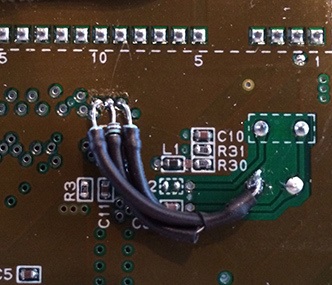SNES:SNES Jr DIY S-RGB Mod: Difference between revisions
Jump to navigation
Jump to search
No edit summary |
m (→Brightness Fix) |
||
| (7 intermediate revisions by 3 users not shown) | |||
| Line 1: | Line 1: | ||
This guide shows you how to enable RGB output on a SNES Mini / Jr using its built-in RGB amp. | |||
== Materials Required == | |||
** | * The 4.5mm tool that opens the SNES | ||
* Philips head screwdriver | |||
* Soldering iron, solder, and flux | |||
* 26-30 AWG wire | |||
* Three 75 Ohm resistors, the lowest tolerance possible | |||
* Three 1.2k resistors, the lowest tolerance possible | |||
== Installation == | |||
The mod is pretty easy, however soldering to the S-RGB chip can be challenging. | |||
# Disassemble the console and remove the heatsink. Locate the S-RGB chip: <br> [[File:SNESMiniRGBModPage02.jpg]] | |||
# Solder four wires to the pins on the “S-RGB A” chip shown below. Use a soldering tip that's extremely thin, as well as very thin solder. Make sure to tin each pin and each wire before trying to solder them together: <br> [[File:SNESMiniRGBModPage03.jpg]] | |||
# It's recommended to use heatshrink tubing to keep the wires together and also protect them from touching any other components. Run the cables through the hole pictured below on the right: <br> [[File:SNESMiniRGBModPage04-1.jpg]] | |||
# Carefully replace the heatsink. Run the wires under the heatsink, since there's enough room. The wires will touch the heatsink but won't be crushed <br> [[File:SNESMiniRGBModPage04.jpg]] | |||
# Cut the wires to size, add the 75 Ohm resistors to the RGB lines, then solder them to the corresponding pins on the multi-out. <br> [[File:SNESMiniRGBModPage04-2.jpg]] | |||
== Brightness Fix == | |||
It's recommended to add resistors to the RGB inputs that adjust the brightness. The mod will work without these resistors, but it's recommended you add them otherwise the picture will be too bright and cause ringing. | |||
{{Note|Super Famicom Jr owners: Check brightness levels before doing this fix. Only some units need them.}} | |||
# Solder three 1.2k resistors between the three holes located directly under pin 10 of the cartridge port and a ground point. The picture below shows non-conductive tape covering the components under the resistor, however using heatshrink tubing is a better solution overall. <br> [[File:SNESMiniRGBModPage06.jpg]] | |||
# Flip the motherboard over and trim the extra length of the leads off of the resistors, as they can short to something if not trimmed. <br> [[File:SNESMiniRGBShrinkTube.jpg]] | |||
Latest revision as of 19:57, 31 July 2022
This guide shows you how to enable RGB output on a SNES Mini / Jr using its built-in RGB amp.
Materials Required
- The 4.5mm tool that opens the SNES
- Philips head screwdriver
- Soldering iron, solder, and flux
- 26-30 AWG wire
- Three 75 Ohm resistors, the lowest tolerance possible
- Three 1.2k resistors, the lowest tolerance possible
Installation
The mod is pretty easy, however soldering to the S-RGB chip can be challenging.
- Disassemble the console and remove the heatsink. Locate the S-RGB chip:

- Solder four wires to the pins on the “S-RGB A” chip shown below. Use a soldering tip that's extremely thin, as well as very thin solder. Make sure to tin each pin and each wire before trying to solder them together:
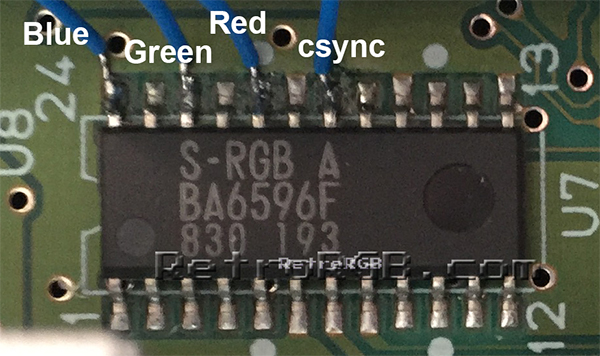
- It's recommended to use heatshrink tubing to keep the wires together and also protect them from touching any other components. Run the cables through the hole pictured below on the right:
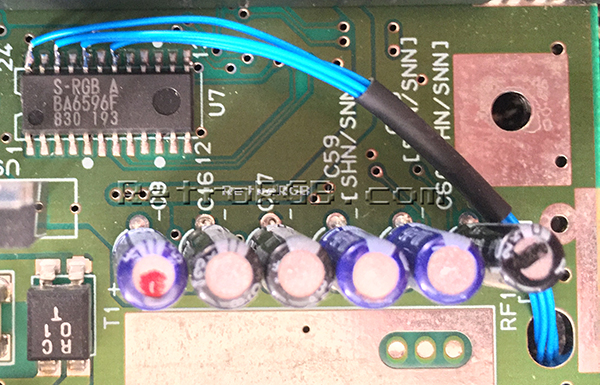
- Carefully replace the heatsink. Run the wires under the heatsink, since there's enough room. The wires will touch the heatsink but won't be crushed
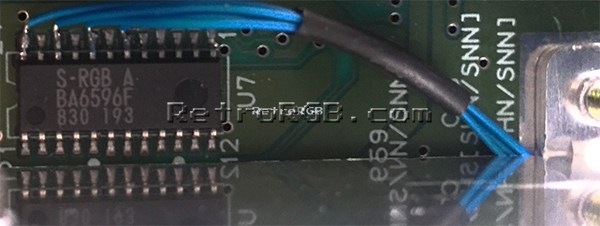
- Cut the wires to size, add the 75 Ohm resistors to the RGB lines, then solder them to the corresponding pins on the multi-out.
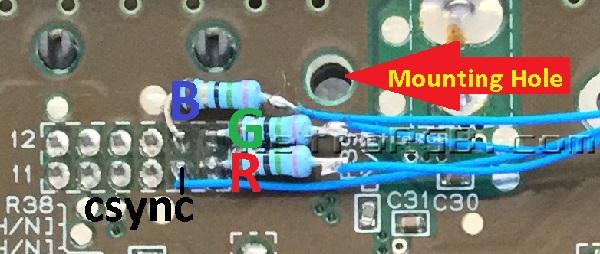
Brightness Fix
It's recommended to add resistors to the RGB inputs that adjust the brightness. The mod will work without these resistors, but it's recommended you add them otherwise the picture will be too bright and cause ringing.
| Super Famicom Jr owners: Check brightness levels before doing this fix. Only some units need them. |
- Solder three 1.2k resistors between the three holes located directly under pin 10 of the cartridge port and a ground point. The picture below shows non-conductive tape covering the components under the resistor, however using heatshrink tubing is a better solution overall.
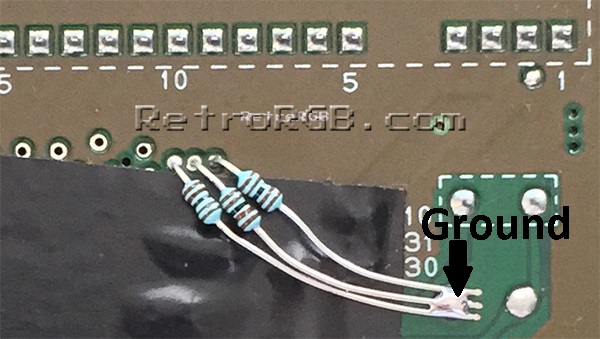
- Flip the motherboard over and trim the extra length of the leads off of the resistors, as they can short to something if not trimmed.
